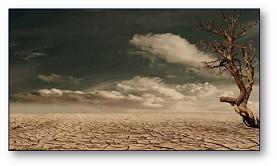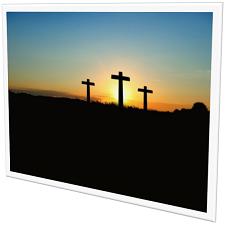Romans 8 - Jesus and Creation: Jesus’ Suffering and Creation
Romans 8 - Jesus and Creation: Jesus’ Suffering and Creation
We often see the Lord Jesus’ suffering especially as God’s way for the salvation of fallen humanity. Redemption from guilt and punishment is indeed at the heart of the biblical message of reconciliation. The Bible makes us very much aware of the severity of sin and its results. The close connection with God is broken, and that has all sorts of consequences for human relationships.
But much more has been broken as a result of the fall into sin.  The original harmony in God’s creation has in various respects had to make room for disharmony. The fall of the first humans has had radical consequences for the earth and for everything that lives and moves upon it. The first Adam has brought sin and death into the world. In this connection we must also think of Genesis 3:17 and 18 where we read of God’s speaking to Adam about the earth being cursed. Thorns and thistles on earth are bitter consequences of the breach with God. The human being will return to the earth. Death and corruption are everywhere.
The original harmony in God’s creation has in various respects had to make room for disharmony. The fall of the first humans has had radical consequences for the earth and for everything that lives and moves upon it. The first Adam has brought sin and death into the world. In this connection we must also think of Genesis 3:17 and 18 where we read of God’s speaking to Adam about the earth being cursed. Thorns and thistles on earth are bitter consequences of the breach with God. The human being will return to the earth. Death and corruption are everywhere.
Perhaps it is good and necessary that in the weeks when we remember Christ’s passion we also consider the relationship between the Saviour’s suffering and the creation.
Jesus’ vision of the earth⤒🔗
It is good in this connection to pay attention to Jesus’ confession in Luke 10:21 about His Father as the Lord of heaven and earth.
Whoever reads the gospel will be impressed with the involvement of Jesus with creation. Everything shows that He really saw the flowers, the trees, the mountains, the animals and the human beings. It is striking how often the Saviour in His teachings uses images taken from nature. He who often lived in the stillness of being alone had as no one else a special relation with the work of creation of His heavenly Father.
This close connection is related to the biblical vision on all of life. There is no ‘neutral’ area. The earth belongs to God. If in our thinking we give attention to relations and organic connections, it will also become easier to understand why the fall of humankind had such tremendous consequences for the entire creation. By his disobedience, man has destroyed not only his own life and that of his descendants, but has also caused creation to be cursed.
During His time on earth, Jesus was and remained the pure and sinless one, but He was subjected to the consequences of sin. He knew hunger, thirst, fatigue, and so on. He has experienced, as no other human has, the brokenness of life because of sin. His pure and sinless spirit must also have suffered because of the mutilation of His Father’s work of creation. If there is one who has ever fathomed the depth of creation’s sighing, it is Jesus!
Creation is sighing←⤒🔗
Romans 8 is a chapter of great depth and enormous breadth. It is true to life and at the same time has an almost heavenly glow. It is a chapter of bitter tears because of suffering and sighing, but it is also one that ends in an enormously joyful confession of victory, wherein God’s love in Christ is extolled. But it is not a cheap consolation. You don’t in any case find that anywhere in the Bible. Cheap consolation is a human product which does not last.
Romans 8 deeply fathoms the need of this life and of fallen creation. We must not quickly read over this, for then we never get ears that really hear the sighing (Romans 8:22) of creation.  Then we talk about sin, but we do not experience how very serious is the breach with God, with each other, and with God’s world. Paul does not provide us here with philosophical considerations about the situation. He digs much deeper; he sees created reality in a theological light, placing everything and everyone before God’s face. Because of this, creation receives a special perspective. Romans 8 deals with what nature is concerned with. With new ears, sharpened by the Spirit, Paul hears a sigh of heart-felt, eager longing! Creation is full of expectation, which means it is focused on the future. That is the essence. We notice a longing here for restoration and wholeness.
Then we talk about sin, but we do not experience how very serious is the breach with God, with each other, and with God’s world. Paul does not provide us here with philosophical considerations about the situation. He digs much deeper; he sees created reality in a theological light, placing everything and everyone before God’s face. Because of this, creation receives a special perspective. Romans 8 deals with what nature is concerned with. With new ears, sharpened by the Spirit, Paul hears a sigh of heart-felt, eager longing! Creation is full of expectation, which means it is focused on the future. That is the essence. We notice a longing here for restoration and wholeness.
Throughout this chapter there is the question about the goal, the outcome of everything. That goes much further than a scientific analysis. The apostle, as it were, introduces a speaking, questioning creation. Listen well! Notice how it (still) mourns. Otherwise we don’t take the crying of creation seriously. The sighing and the looking forward show us the way.
Creator and creation←⤒🔗
The creature does not find a goal in himself, but focuses on the Creator and His glory. Whoever mixes things up here falls into the error of Romans 1:21 with all its terrible consequences. Because of the fall of man, creation has been drawn into the sphere of emptiness and fruitlessness. According to Genesis 1:31, God has made everything very good. This is also the testimony of 1 Timothy 4:4 and Titus 1:15. The sinful human being deals wrongly with God’s creation, and that has its consequences. Creation suffers because of this. People try to find in creation what can only be found in the Creator. Those who acknowledge God learn to see life properly, as it was intended by God. Those who have not learned to discern in a spiritual manner also don’t understand the meaning of God’s creation. Human abuse puts a burden on creation.
But the sighing of Romans 8 has also the character of the pains of childbirth.  Here a perspective opens. The creature, too, shall become free! Then decay is for creation a thing of the past. By means of a process of change, God works toward the new heaven and the new earth. In Romans 8 we notice the tension of the great difference between ‘now’ and ‘then’!
Here a perspective opens. The creature, too, shall become free! Then decay is for creation a thing of the past. By means of a process of change, God works toward the new heaven and the new earth. In Romans 8 we notice the tension of the great difference between ‘now’ and ‘then’!
Now there is for the creature still the service to the decaying humanity, which at the same time the creature so often abuses. Then, in the great future, there will be the glorious freedom. Now creation is largely handed over to abuse by the godless. Then, delivered, it will serve the glory of God’s children. And so everything in fact prays for the great breakthrough of God’s salvation!
Jesus’ suffering provides perspective←⤒🔗
The sin of the first Adam has important consequences. For unaided humanity there is no way back. But in the coming of the second Adam there is the fundamental turn-about for humankind and for the world. The first coming of Jesus in the flesh is a coming under the curse, in order to remove that curse. When we really discover the Saviour in His suffering, then we notice His defamation and humiliation in so many areas, but especially during the last phase of His life. There is so much there that speaks of the curse which He voluntarily took upon himself. The fact of being God’s image, which Adam had lost through sin, the Servant of the Lord has in this road of deep suffering regained and restored. He dies on the wood of the cross as a cursed one.
The Old Testament describes the terrible character of that death. If a dead person should remain on the cross, the country will be polluted (Deuteronomy 21:23; cf. Galatians 3:13).  The Saviour has been hanging between heaven and earth. The earth has expelled Him; heaven could not yet receive Him (who was loaded with guilt and curse). The greatest defamation and loneliness are His. The last bit of human dignity is taken from Him on the cross. He hangs there naked, as a spectacle. A real refreshment to lesson His thirst is withheld from Him.
The Saviour has been hanging between heaven and earth. The earth has expelled Him; heaven could not yet receive Him (who was loaded with guilt and curse). The greatest defamation and loneliness are His. The last bit of human dignity is taken from Him on the cross. He hangs there naked, as a spectacle. A real refreshment to lesson His thirst is withheld from Him.
In Matthew 27:45 we read of the three hours of darkness during the crucifixion. The sun no longer shines for Jesus (see the contrast with Matthew 5:45). This darkness is a sign of God’s announcement of judgment (cf. Amos 8:9 and Joel 2:31). It is an expression of God’s anger against the country and people that have laid violent hands upon the Son. God, as it were, turns Himself away.
It is also a statement of the absolute decisiveness of what is happening on the hill of the cross. Jesus’ suffering and death are accompanied by signs of the final judgment. In this suffering and death, God in principle already begins the great reckoning with the world. The judgment descends in all its weight upon the Son. That is how guilt and curse are taken away. Who will ever be able to fathom the depth of this? Here the decisive event has happened that is needed for the deliverance of the earth. Because of the cross of Golgotha, the curse on the earth does not have the last word; rather, there is reconciliation and renewal.

Add new comment